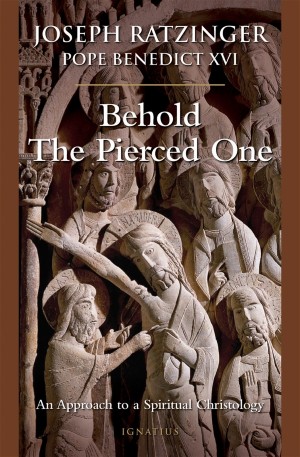What Can St. Augustine’s Penitential Eucharistic Fast Teach Us Today?
COMMENTARY: Cardinal Joseph Ratzinger discussed the matter in a 1986 text that is being widely circulated in these days.

It’s a fair bet that many Catholics have done more spiritual reading than usual during this Holy Week of isolation, and many will have chosen Pope Benedict XVI’s Jesus of Nazareth: Holy Week, perhaps the most learned book of biblical theology published in generations.
Another text of Joseph Ratzinger has been widely circulated in these days, an excerpt from a collection published in 1986 by Ignatius Press, Behold the Pierced One. Cardinal Ratzinger takes up an episode from the life of his great theological model, St. Augustine.

The great bishop and doctor of the Church undertook a penitential “fast” from the Eucharist at the end of his life. Ratzinger allows that this is not what would have been expected from those who followed Augustine’s writings.
“Against the background of his sermons and writings, which are a magnificent portrayal of the mystery of the Church as communion with the Body of Christ, and as the Body of Christ itself, built up by the Eucharist, this is a profoundly arresting gesture,” Ratzinger confesses.
Does this “arresting gesture” — perhaps difficult to understand today — mean anything for us today? In particular, during this Holy Week? Cardinal Ratzinger suggests that it might have lessons to teach us.
“The more I think of it, the more it moves me to reflection,” Ratzinger writes. “Do we not often take the reception of the Blessed Sacrament too lightly? Might not this kind of spiritual fasting be of service, or even necessary, to deepen and renew our relationship to the Body of Christ?”
The superabundance of the sacraments in some places, where it might be possible to find a dozen daily Masses within reasonable distance, has allowed a certain complacency to take root. The sacraments are always available, and thus can be taken for granted.
It is almost impossible to maintain sincere reverence for that which becomes familiar. Without desiring it, many of us can even feel entitled to the Eucharist, to the Holy Mass, to the sacraments, even to salvation itself.
Cardinal Ratzinger points out that:
… the ancient Church had a highly expressive practice of this kind. Since apostolic times, no doubt, the fast from the Eucharist on Good Friday was a part of the Church’s spirituality of communion. This renunciation of communion on one of the most sacred days of the Church’s year was a particularly profound way of sharing in the Lord’s Passion; it was the Bride’s mourning for the lost Bridegroom (cf. Mk 2:20). Today too, I think, fasting from the Eucharist, really taken seriously and entered into, could be most meaningful on carefully considered occasions, such as days of penance — and why not reintroduce the practice on Good Friday?
The Church does not celebrate the Holy Mass on Good Friday or Holy Saturday (until the evening vigil begins Easter). Should no Mass mean no Communion, given the link between the Holy Mass and Holy Communion?
At times during Church history, that was the practice, no Holy Communion on Good Friday. Now Holy Communion is distributed with Hosts that have been consecrated earlier, at the Holy Thursday Mass of the Lord’s Supper.
Might a common Eucharistic fast be a worthy practice to study?
Certainly the experience of going without Holy Communion for weeks or months will open new considerations arising from this involuntary experience. If the practice of Eucharistic fasting were to return in any communal, as opposed to personal, form, Good Friday would be the traditional day on which to revisit it.
Cardinal Ratzinger stresses that a Eucharistic fast cannot be motivated by an exaggerated sense of unworthiness, which at times meant that pious Catholics mighty only receive Holy Communion rarely, perhaps a few times a year.
“Naturally, I am not suggesting a return to a kind of Jansenism,” Ratzinger writes. “Fasting presupposes normal eating, both in spiritual and biological life. But from time to time we do need a medicine to stop us from falling into mere routine which lacks all spiritual dimension. Sometimes we need hunger, physical and spiritual hunger, if we are to come fresh to the Lord’s gifts and understand the suffering of our hungering brothers. Both spiritual and physical hunger can be a vehicle of love.”
The common practice today of daily Mass and Holy Communion is, while commendable and holy, was not always the way Catholics thought.
For example, St. Ignatius of Loyola was ordained a priest on June 24, 1537. He earnestly wanted to offer his first Holy Mass in the Holy Land and waited for more than a year to find a way to get there. But pilgrimage was nearly impossible at that time and so on Christmas 1538 — 18 months later — he offered his first Holy Mass at St. Mary Major in Rome, over the relics of the Nativity crib.
Newly-ordained priests today usually offer their first Holy Mass within 24 hours. They are not wrong to do so, but liturgical and Eucharistic piety has taken different forms throughout history.
Cardinal Ratzinger presents the Eucharistic fast to combat complacency or over-familiar routine. But we might be bold enough to go a step farther, and ask whether this Eucharistic fast is permitted by God as a disciplinary penance, an involuntary absence to make up for the Real Presence that was so often taken for granted.
We cannot know whether this global Eucharistic fast is meant as a penance for all those poorly prepared Holy Communions, those Holy Communions taken for granted, those Holy Communions received unworthily, even sacrilegiously. We cannot know, but we might reflect on that to spiritual profit.
After a Holy Week without Holy Communion for the faithful, a renewed theological and spiritual examination of fasting from the Eucharist will be in order.
Father Raymond J. de Souza is the editor in chief of Convivium magazine.















